How paper book price impacts sales
The minimum price you can sell a print-on-demand paper book is set by the service you use. They must cover their costs and make a profit. To that minimum price the retail store must add their shipping costs and profit. On top of this you add your desired royalty. It's little wonder that paper books normally cost a lot more than ebooks.
Is that a bad thing? It certainly makes the price you set for ebooks a lot more attractive.

How ebook price impacts sales
Let's consider Amazon first since they sell 70% of the world's ebooks. Usually e-retailers set a minimum price of US 0.99 since below that it's not economic to take the payment.
Amazon offer the following royalties to authors:
- Free ebooks - obviously $0.00 royalty.
- $0.99 to $2.98 ebooks - 35% of book price with no delivery charge.
- $2.99 to $9.99 ebooks - 70% of price less a delivery charge of $0.15 per megabyte of file size.
- $10 and over - 35% of book price with no delivery charge.
Let's see how much that works out at per ebook. We'll choose a romance ebook with a file size of about 4 MB size - that's about 112,000 words, the file size readers seem to prefer but bigger than most.
- Free ebooks - obviously $0.00 royalty.
- $0.99 ebooks - $0.35
- $1.99 ebooks - $0.70
- $2.99 ebooks - $1.49
- $3.99 ebooks - $2.19
- $4.99 ebooks - $2.89
- $5.99 ebooks - $3.59
- $6.99 ebooks - $4.29
- $7.99 ebooks - $4.99
- $8.99 ebooks - $5.69
- $9.99 ebooks - $6.39
- $10.00 ebooks - $3.50
- $18.27 ebooks - $6.39
- $18.28 ebooks - $6.40
Notice how if you increase the price by a cent from $9.99 to $10.00 you earn far less in royalties? That's because any ebook more than $9.99 earns only a 35% royalty. In fact it's only at $18.28 that this ebook would earn more than if it was priced $9.99.
You won't be surprised to find that by far the most popular book price is free. In fact according to Mark Coker of Smashwords in a 2013 report a free ebook is downloaded 91 times as many times as a priced ebook. Note: downloads do not necessarily mean the ebook has been read. Lots of people appear to collectfree ebooks, download them and never get around to reading them. This isn't true for books people buy so if offering a free series starter isn't producing results then make a charge for that book.
In general, the lower the cost, the more copies an ebook sells. I looked at a graph that Mark Coker produced in the same 2013 report and added the row in red to compare the royalties an author could expect for royalty sales at each price point compared with a $10 ebook.
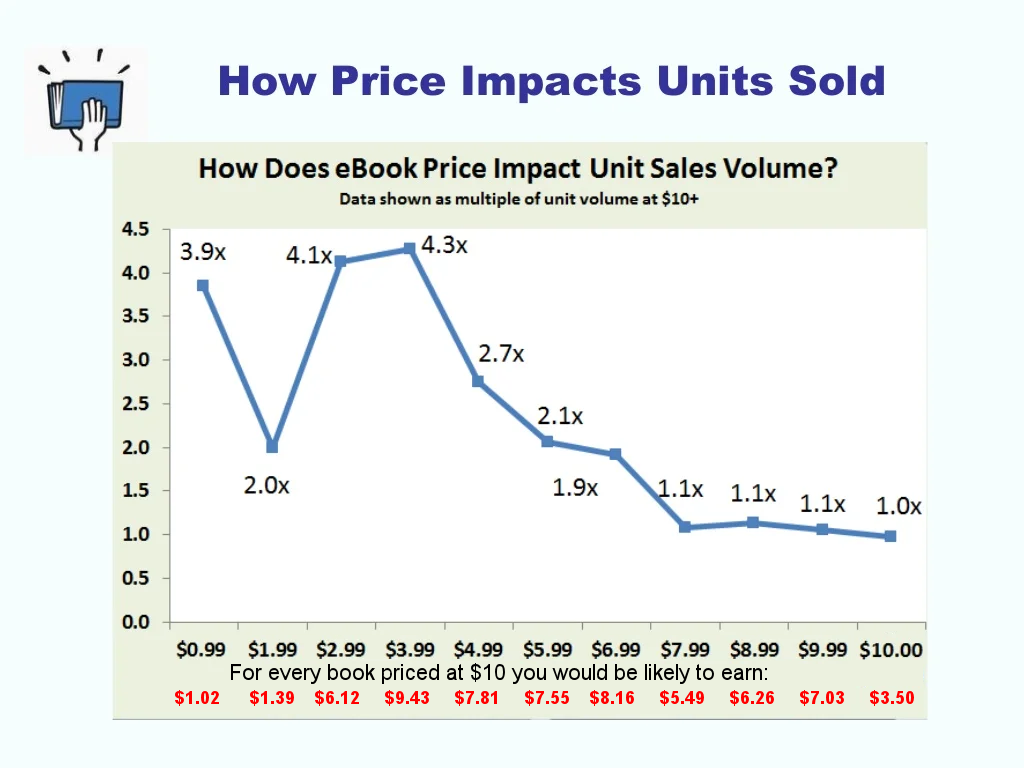
It's not hard to see that the optimum price point for a normal sized ebook is $3.99. This price gives an author room to discount an ebook as a $2.99 sale price without having to go into the 35% royalty rate.
There's a traditionally published ebook I know of which was sold at $19.20 in the US. It's by a well known technology author. It's rank steadied at #246,399 when I checked which means sales of about 13 per month. A self-publisher would have earned about $85 per month from this but a traditionally published author could expect 15-25% of this. When the price was reduced to $10.99 the Kindle rank shot up to 18,824 which means sales of about 209 per month. A self-published author would get about $800 from this but remember, traditionally published authors get that 15-25% . Had the author been self-published and sold the ebook for $9.99 sales would have been even higher but even assuming the same number of sales the author could expect $1,250 per month.
Notice how these prices all end in '.99'? We all know in reality there is little difference between $3.99 and $4.00 but no matter how much we are aware of this we perceive $3.99 as being a bargain compared with $4.00. Salesmen have been aware of this since the start of money. A house priced 399,995 is far more likely to sell than one priced 400,000. Apple used to round up all ebook prices to the next 99 cents but had to stop doing this in 2016 when they lost a court case and were banned from using the agency model (where publishers set the prices) for ebooks. Today it is authors who set the prices there and many authors still use the 99 cent model for prices.
If you find this guide useful...
Can you help me out?
If you find these pages useful you can return the favour by downloading a FREE ebook from Amazon - even if you don't read it, it will help our rankings! I think you'll probably like it though.
It's the first book of a series of 9 books (so far) which tell the story of how life on Earth was saved from a cataclysmic extinction when a rogue planetoid collides with Earth in 7141. This first book deals with how humanity was made immortal, giving us the incentive to do something about an event so far in the future.
Take a touch of humour, add some genetic science and nanotechnology. Steep with conspiracy and stir in murder and despair. Season with romance between three people in a secret location. Garnish with morality.
The result is 'Immortality Gene', the first in a novel series by John and Shelia Chapman. The ebook of book 1 is FREE and available at multiple retailers
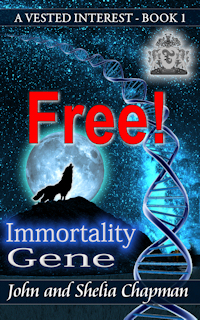
Get it from your favourite store
Kindle readers - Get your copy at Smashwords where it's free.
I read a lot and I've simply run out of shelf space for my 3,000+ book collection. I would normally choose to buy ebooks unless I want a book to collect and in that case I choose a hardback.
Is it always best to choose the 70% royalty rate?
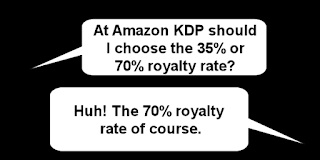
You would think this is an obvious choice but the answer depends on if your book contains a lot of graphics. Graphics increase file size dramatically and with that the download charges

As you can see selecting the 35% royalty rate will earn more.
Or maybe a free online interactive adventure story?
Back in 1982 early text only adventure games were being written for home computers. One such game was 'Castle of Riddles' written by Peter Killworth and published by Acornsoft. Now it's been re-written and greatly expanded with added images and sound. Play it on your computer, tablet or even a phone.
Check it out at https://jaydax.co.uk/corr
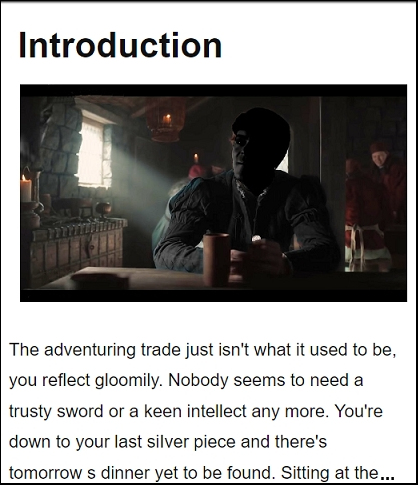
The FREE problem
Obviously if you make a book free you are not going to earn anything in royalties. Despite that, many authors give away a free book one of a series. The hope is that having read book 1 they will go on to buy more of the series. That works. The problem is that there are so many books being given away free that many are downloaded and never read. Be honest - Have you downloaded a free ebook and never read it? I know have. How do you get round that?
- Give away a free ebook in exchange for subscribing to an author mailing list.
That way you can send a reminder about that book asking for author feedback and possibly a review. - Use a #BOGOF offer. BOGOF stands for Buy One Get One Free. You package two ebooks in a single purchase and charge 99¢ for the pair. The reader still gets a free ebook but also gets the second of the series at a special price. Because they have bought this the ebooks are more likely to be read.
- Use a #PAPMAGT offer. PAPMAGT stands for Pay A Penny More And Get Three and it's ideal for when BOGOF offers stop working or Amazon insists on charging money for a book which you wanted to make free. Here's how to do it. Make book one of the series 99¢/77p Produce a second book collection containing three (or two) books of the series for $1.00/78p. The reader knows that 99¢ is really $1.00 in disguise and that paying one cent/penny more will make no difference. They know they are getting a bargain and are likely to read it.
More text
what about other e-retailers?
Smashwords seems to offer royalty rates of as much as 85% but to get this rate you would have to not allow affiliate payments. This is done on a per book basis. Without opting out or changing affiliate payments the author will get 74% royalty. (I offer a 35% affiliate rate on most of my ebooks there.)
Most of the other e-retailers offer a similar royalty rate structure to Amazon for direct submission by the author. This can be reduced if the author publishes through a book aggrigator such as Draft2Digital, Smashwords, PublishDrive or others. It can be time consuming to publish to each e-retailer directly so to me, I don't mind using a book aggrigator's services for e-retailers apart from Amazon.
What about self-published paper books?
The last paper book I published was a test of the latest version of Amazon Print. A collection of four short time travel stories called Time After Time. It's a slender volume of 105 pages with four full colour pages and Amazon charges £2.95 ($3.84) to print it. Amazon have a royalty calculator page at https://kdp.amazon.com/en_US/royalty-calculator. Using that I find I need to charge £7.65 ($9.75) to get about the same royalty as the £2.35 ($2.99) ebook
Do I expect to sell many paperbacks? No, but having them available makes the ebook price look very attractive. Amazon will say 'Save 69%.' on the ebook's page.
Want a short story instead?
I've written a number of short time travel stories. Each is 99p/99¢ and great for taking a break from writing.
Check them out at http://iwadasn.info
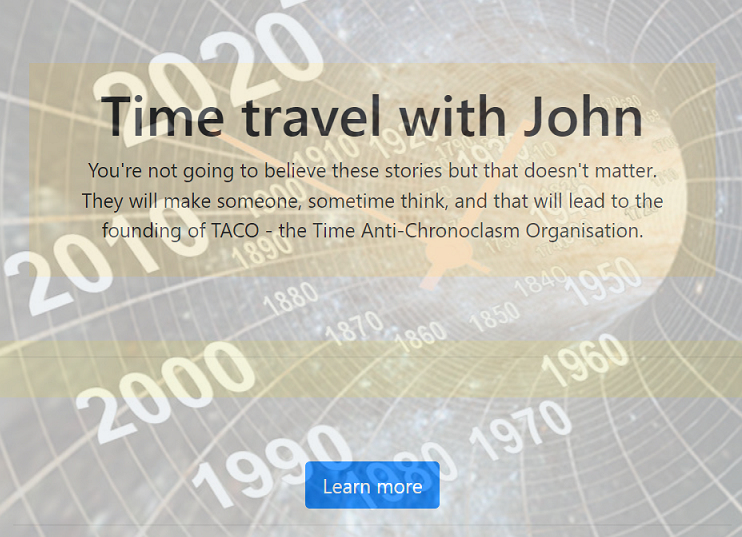
There are four short stories:
Ripping Time explains that Jack the Ripper was a time traveler and he had a good reason for his murders.
Witch Time explains the Blair witch event.
Titanic Time tells why the Titanic had to sink.
Time Flies is a story about why Leonardo da Vinci isn't recorded as the world's first aeronaut, also explains the Mary Celeste mystery and what happens if you do travel back in time and kill your grandfather.
Traditional Publishing And Their Crazy Prices
Take a look at this traditionally published best seller sold at Amazon. (A pet gripe of mine.)
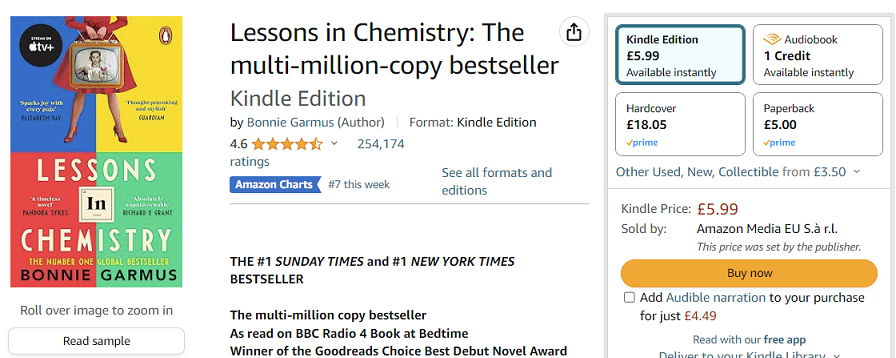
Compare the Kindle ebook price with the paperback price. The publishers, Transworld Digital, which is owned by Penguin Random House, has the nerve to charge £0.99 more than the paperback price and that's the reason I will never buy it unless I find it in a second hand store at 50p. Ebooks should always cost less than any new paper book!
Here's why:
| Paper books | E-books | Best? | |
|---|---|---|---|
| 1 | Requires an author | Requires an author | Same |
| 2 | Requires an editor | Requires an editor | Same |
| 3 | Requires formatting | Requires formatting | Same |
| 4 | Trees need to be felled (requires oil) | Not required | ebooks |
| 5 | Timber needs to be transported to papermill (requires oil) | Not required | ebooks |
| 6 | Papermill manufactures paper with some waste sludge (requires some oil) | Not required | ebooks |
| 7 | Sludge needs to be disposed of (requires oil) | Not required | ebooks |
| 8 | Paper needs transporting to printer (requires oil) | Not required | ebooks |
| 9 | Ink needs manufacturing (requires oil) | Not required | ebooks |
| 10 | Books need to be printed (requires oil) | Not required | ebooks |
| 11 | Books need to be transported to distribution depot (requires oil) | Not required | ebooks |
| 12 | Sales team need to visit retail outlets (requires oil) | Not required | ebooks |
| 13 | Books need to be transported to retail outlets (requires oil) | Not required | ebooks |
| 14 | Customer needs transport to bookstore and back (requires oil) | E-books are delivered direct to reader electronically. | ebooks |
| 15 | Surplus unsold books need transport back to printer (requires oil) | Not required | ebooks |
| 16 | Surplus requires storage or redistribution or pulping (requires oil) | Not required | ebooks |
| 17 | Book pulp requires cleaning of toxic ink and disposal of the toxins (requires oil) | Not required | ebooks |
As you can see most of the tasks needed for a paper book are not required for an ebook. This makes them less expensive and more environmentally friendly too. Making an ebook more expensive than a paper book is simply wrong. The only possible justification is to protect the profits on paper books.
Next step: Order and check a proof copy of paper books.
